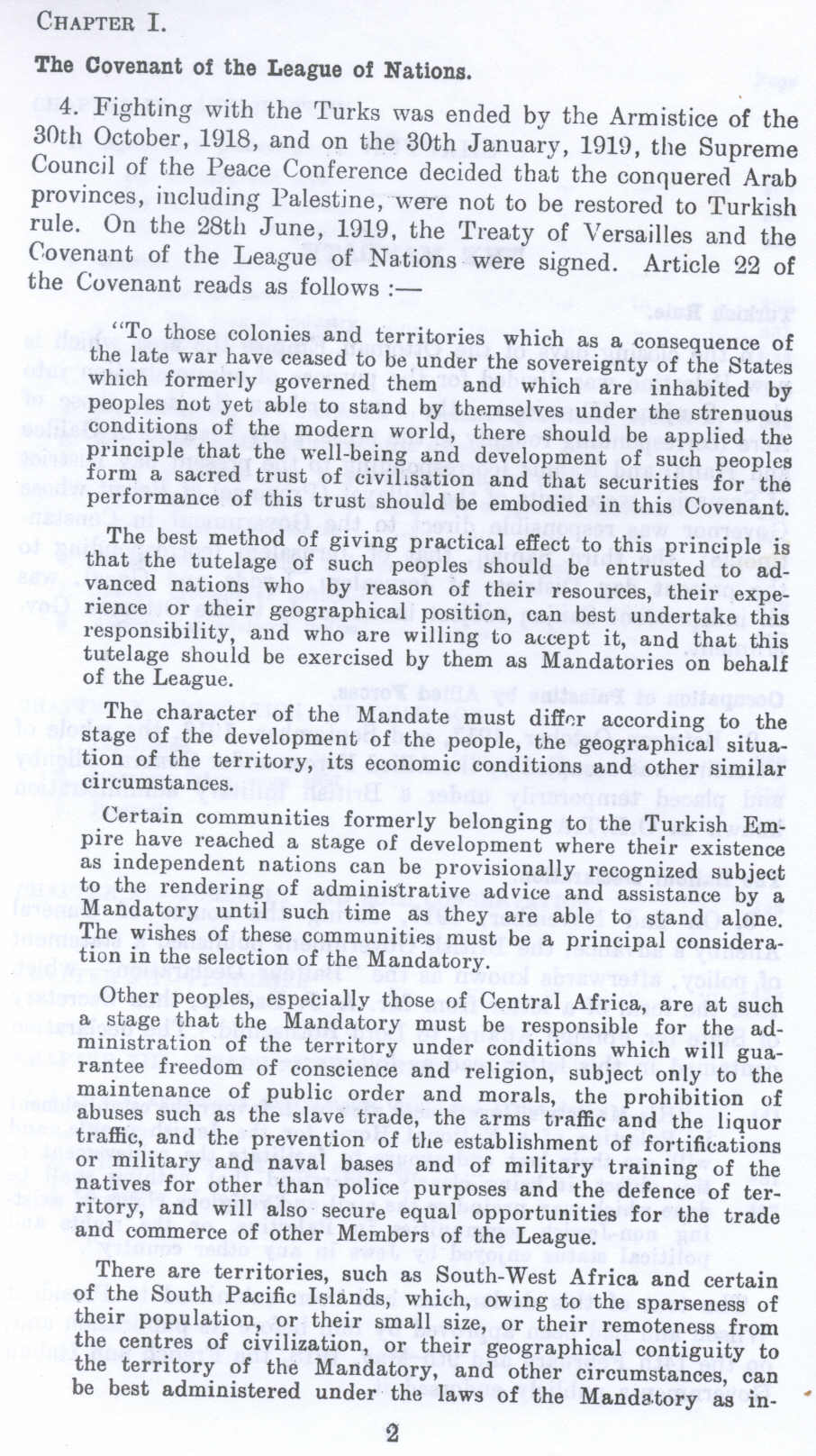| Prev | Next |  |
| Prev | Next |
| PalestineRemembered | About Us | Oral History | العربية | |
| Pictures | Zionist FAQs | Haavara | Maps | |
| Search |
| Camps |
| Districts |
| Acre |
| Baysan |
| Beersheba |
| Bethlehem |
| Gaza |
| Haifa |
| Hebron |
| Jaffa |
| Jericho |
| Jerusalem |
| Jinin |
| Nablus |
| Nazareth |
| Ramallah |
| al-Ramla |
| Safad |
| Tiberias |
| Tulkarm |
| Donate |
| Contact |
| Profile |
| Videos |
The Covenant of the League of Nations on Palestine. British Mandate: A Survey of Palestine, The Mandate: : Volume I - Page 2 |
Disclaimer
The above documents, article, interviews, movies, podcasts, or stories reflects solely the research and opinions of its authors. PalestineRemembered.com makes its best effort to validate its contents.


Post Your Comment
*It should be NOTED that your email address won't be shared, and all communications between members will be routed via the website's mail server.
The Covenant of the League of Nations.
4. Fighting with the Turks was ended by the Armistice of the 30th October, HHS, and on the 30th January, 1919, the Supreme Council of the Peace Conference decided that the conquered Arab provinces, including Palestine, were not to be restored to Turkish rule. On the 28th June, UJ19, the treaty of Versailles and the Covenant of the League of Nations were signed. Article 22 of the Covenant reads as follows :-
“To those colonies and territories which as a. consequence of the late war have ceased to be under the sovereignty of the States which formerly governed them and which are inhabited by peoples not yet able to stand by themselves under the strenuous conditions of the modern world, there should be applied the principle that the well-being and development of such peoples form a sacred trust of civiheat.ion and that securities for the performance of this trust should be embodied in this Covenant.
The best method of giving practical effect to this principle is that the tutelage of such peoples should be entrusted to advanced nations who by reason of their resources, their experience or their geographical position, can best undertake this responsibility and who are willing to accept it, and that this tutelage should be exercised by them as Mandatories on behalf of the League.
The character of the Mandate must differ according to the stage of the development of the people, the geographical situation of the territory, its economic conditions and other similar circumstances.
Certain communities formerly belonging to the Turkish Empire have reached a stage of development where their existence as independent nations can be provisionally recognized subject to the rendering of administrative advice and assistance by a Mandatory until such time as they are able to stand alone. The wishes of these communities must be a principal consideration in the selection of the Mandatory.
Other peoples, especially those of Central Africa, are at such
a. stage that the Mandatory must be responsible for the administration of the territory under conditions which will guarantee freedom of conscience and religion, subject only to the maintenance of public order and morals, the prohibition of abuses such as the slave trade, the arms traffic and the liquor traffic, and the prevention of the establishment of fortifications or military and naval bases and of military training of the natives for other than police purposes and the defence of territory, and will also secure equal opportunities for the trade and commerce of other Members of the League.
There are territories, such as South-West Africa. and certain of the South Pacific Islands, which, owing to the sparseness of their population, or their small size, or their remoteness from the centres of civilization, or their geographical contiguity to the territory of the Mandatory, and other circumstances, can be best administered under the laws of the Mandatory as integral
2